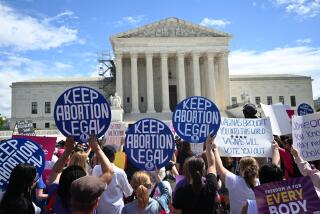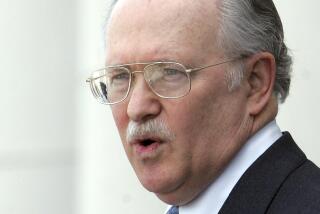Marriage ruling is a religious quandary
Pastor Gregory L. Waybright struggled from the pulpit Sunday to reconcile the laws of God with the laws of man.
Though he wanted his church “to be a welcoming and loving house,” he told worshipers at Lake Avenue Church in Pasadena, the California Supreme Court’s decision last week to legalize gay marriage in California “is a contradiction of what God’s word says.”
The 4-3 ruling, which held that same-sex couples have a constitutional right to marry, has prompted conservative and liberal congregations alike to discuss whether gay and lesbian members will be allowed to wed in their churches, synagogues and temples.
“These are the kinds of issues every religion has to grapple with,” said James A. Donahue, president of the Graduate Theological Union, a Berkeley-based consortium of theological schools. “How do you factor in the role of contemporary human rights, civil rights, the data about homosexuality” with “core traditions and beliefs?”
At Neighborhood Unitarian Universalist Church of Pasadena, the mood was celebratory Sunday, with Mendelssohn’s “Wedding March” played at services in honor of the decision.
At Congregation Kol Ami in West Hollywood -- which offers “outreach to the gay, lesbian and bisexual community,” according to its website -- Rabbi Denise L. Eger’s e-mail box was filled almost instantly with requests from joyful congregants wanting to get married.
But at the Islamic Society of Orange County, Imam Muzammil H. Siddiqi told his congregation during Friday prayers that the high court’s decision was a severe disappointment and goes against Islamic teaching.
The ruling “is a violation of God’s law,” Siddiqi, an authority on Islamic law, said in an interview. “I hope all people of faith -- Jews, Christians and Muslims -- speak up against this.” At Lake Avenue, a large and diverse church that is part of the Conservative Congregational Christian Conference, Waybright told worshipers that he did not want to be “self- righteous or condemn anyone.” Still, he said, “it’s my responsibility . . . to keep pointing you to God’s way.” The Bible, he noted, makes clear that marriage is between a man and a woman.
A mile or so away at All Saints Episcopal Church, the Rev. Susan Russell led a between-services forum on the religious, legal and political ramifications of the court’s decision.
“The justices have ruled in favor of the sanctity of marriage and against bigotry,” Russell declared, as the audience cheered. “This is good news for all Californians.”
But even though All Saints has been blessing same-sex unions for more than 15 years, the ruling unleashed a wave of uncertainty.
“At this point in the Episcopal Church, our prayer book still defines marriage between a man and a woman,” Russell said in an interview. “There’s some question about whether we can, within the canons of our church, extend the sacrament to same-gender couples.”
The decision raises questions, too, about what All Saints’ blessing ceremonies mean anymore, Russell said. Should couples who have had such ceremonies get married too? Will the civil steps suffice? Or should they go through another church ritual? And what kinds of ceremonies will All Saints provide as it moves forward?
The questions are personal for Russell, who celebrated her union with her partner in an official blessing ceremony two years ago. Russell said she and her partner haven’t begun discussing what the new ruling will mean for them. As for her church, she said, “I’m glad we have 30 days to think it through.”
In recent years, conflicts over homosexuality and the Bible have unsettled many denominations, especially such mainline Protestant churches as Methodists, Presbyterians, Evangelical Lutherans and Episcopalians.
Although the specifics vary, the controversies for all of these faith groups and for Conservative Judaism have revolved broadly around whether to provide official recognition to the unions of same-sex couples and whether to allow openly gay and lesbian clergy.
Thursday’s court decision is expected to add fuel to the debate, with several denominations poised to again take up gay-related issues at their national conventions this year.
William McKinney, president of the Pacific School of Religion in Berkeley and a professor of American religion there, said the ruling was applauded on his campus, which is a multidenominational, theologically liberal Christian seminary.
Yet he said he felt an element of trepidation as well.
“We’re celebrating it on the one hand,” McKinney said, noting that San Francisco’s 2004 decision allowing same-sex weddings had given many people, both gay and straight, new appreciation for the powerful symbolism of marriage.
“On the other hand, though, this sets us up for another round of the culture wars,” he said. “As a straight, married man, I feel for my gay friends whose private life is once again going to be the subject of public debate.”
Though gay unions are prohibited in Orthodox Judaism, other branches of the faith have varied widely in their attitudes and practices.
For Rabbi Harold M. Schulweis, who heads the Conservative Jewish congregation at Valley Beth Shalom in Encino, the court’s decision has changed the way he will handle celebrating the unions of gay and lesbian couples at his synagogue.
“I did not in the past. I will now,” he said in an interview. “I was really waiting for this [decision]. . . . From my point of view, it’s a very courageous thing and is part of the evolution of religious mores.”
Schulweis has been a rabbi for more than half a century and has seen his religion evolve, he said, first allowing women into the full “ritual life of the community,” then ordaining them as rabbis and cantors, and eventually embracing homosexuals.
“It’s one of the most exciting parts of seeing religion as not static and inflexible but as sensitive to different times and different information and different knowledge,” Schulweis said.
“What in the world did people in the biblical time know about homosexuals?”
In contrast, since 2000 rabbis in Reform Judaism have been allowed to officiate at same-sex commitment ceremonies. Reform Rabbi Lawrence Goldmark, who leads Temple Beth Ohr, a La Mirada congregation, said he has never been asked to perform a same-sex ceremony, but would be happy to marry anyone -- as long as they’re Jewish.
At Second Baptist Church in Los Angeles, the Rev. William Epps said his congregation has been focused on its 123rd anniversary -- which it celebrated Sunday -- and has given no thought to the Supreme Court ruling.
Traditional Baptist churches “would not embrace same-sex marriages,” Epps said, although he would be happy to devote a Bible study session to the matter if anyone wanted.
He himself has never been asked to bless a same-sex union. And what would he do if a homosexual couple asked him to marry them now?
“I’d have to prayerfully think about it,” Epps said in an interview. “I would think it would be something I would have to seriously grapple with.”
--
hector.becerra@latimes.com
rebecca.trounson@latimes.com
More to Read
Start your day right
Sign up for Essential California for news, features and recommendations from the L.A. Times and beyond in your inbox six days a week.
You may occasionally receive promotional content from the Los Angeles Times.








